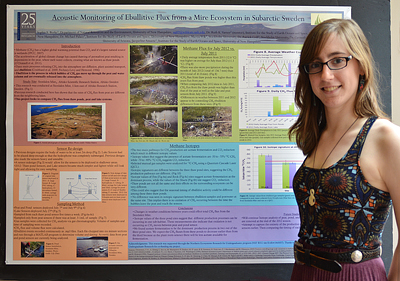Sophia Burke
University of New Hampshire
Environmental Science-Ecosystems major
I spent the first month of this program building my sensors in Dr. Ruth Varner’s lab at the University of New Hampshire. I really like building things so I was happy to rise to the challenge of combining the designs of the peat sensors and the lake sensors in order to build an effective thaw pond sensor.
These sensors have been sampled almost everyday since they were installed and I have been able to run these gas sampled on the Gas Chromatograph here at Abisko in order to calculate the concentration of each volume of gas I sampled.
Based on the thaw pond samples I have successfully run through the GC here at Abisko, I have found that the thaw ponds samples contain between 10% and 30% methane. Considering I am sampling these sensors generally every other day, this is a significant amount.
There are six peat sensors that I also installed when we first arrived in Abisko. These sensors were deployed in areas close to the thaw pond sensors, but these sensors are measuring ebullition events occurring in the peat (hence the name). Since the peat remains colder for longer, we have yet to see any measurable methane flux captured in these sensors. Since the peat sensor excitement will be most likely occurring after I leave Abisko, Dr. McCalley, a post-doc working at Abisko will sample the peat sensors and thaw pond sensors after we leave.
Dr. McCalley will be running the samples she collects for us on a Quantum Cascade Laser (QCL), which detects what isotopes of methane are present within these ebullition samples. This is very new technology with a new application, which makes it all very exciting!
 |
Acoustic monitoring of ebullitive flux from three sub-Arctic Sweden ecosystems. Co-authors: Ruth K. Varner, Michael Palace, Martin Wik, Patrick Crill, Carmody K. McCalley, Jacqueline Amante; Mentor: Ruth Varner |
|

